Reflection on a Living Christianity visit to the Holy land
28 February 2023
28 February 2023
But as it is, they desire a better country, that is, a heavenly one (Hebrew 11:16, NRSV)
Going on the Living Christianity programme this January, gave me the opportunity to visit the Holy Land for the first time.
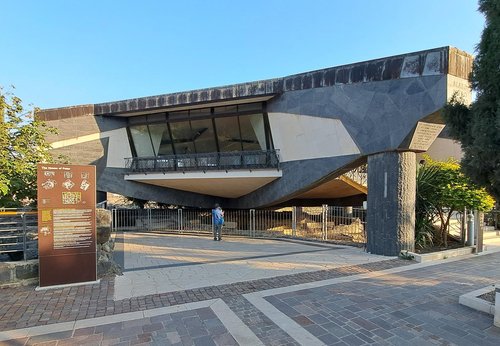 I tried to take in the experience of being in churches built over the top of sites historically linked to the events of the life of our Lord Jesus:
I tried to take in the experience of being in churches built over the top of sites historically linked to the events of the life of our Lord Jesus:
Over the house where Gabriel was said to have met Mary over the house where Peter’s mother-in-law was thought to have been healed (see right)
over the rock where Jesus was said to have prayed in Gethsemane
over Calvary and the tomb provided by Joseph of Arimathea over the rock where the risen Christ might have said to Peter, ‘Feed my sheep’, with the Sea of Galilee, from which the miraculous draught of fish had been pulled, as serene and beautiful witness just beside.
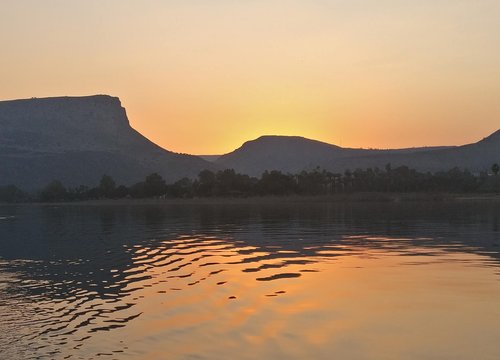 As a boy, upon arriving a secondary school, I was given, a copy of the Revised Standard Version of the Bible, with line drawings by Horace Knowles.
As a boy, upon arriving a secondary school, I was given, a copy of the Revised Standard Version of the Bible, with line drawings by Horace Knowles.
One was given ‘To all the boys and girls of Nottinghamshire’. I still need to use such an edition, and have got through many copies over the years, as I can find passages by reference to where the pictures are on the page.
I took a copy with me and marvelled to see how accurately these images, that I have lived with for years, reflected the sites that I was seeing, from the cliffs in Decapolis on the other side of the lake, to the streets of Jerusalem.
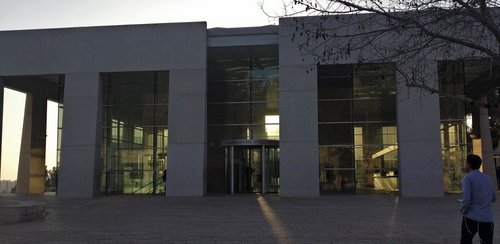 The Living Christianity programme interwove visits to historical sites, with encounters with those living in the land today. We met Hedva Haymov, a Messianic Jew working for reconciliation in this fractured land, and were confronted with the horrific evil of anti-Semitism at Yad Vashem, the memorial to the holocaust.
The Living Christianity programme interwove visits to historical sites, with encounters with those living in the land today. We met Hedva Haymov, a Messianic Jew working for reconciliation in this fractured land, and were confronted with the horrific evil of anti-Semitism at Yad Vashem, the memorial to the holocaust.
Set in the Week of Prayer for Christian Unity, we attended ecumenical services in the Syriac, Ethiopian and Lutheran Churches in Jerusalem and met many Palestinian Christians: Theirs is a community that calls itself the ‘Living Stones’, because they, and not historic buildings, are Christ’s Church in that land today.
Among those ‘Living Stones’, we went to spend an afternoon with the Nasser family on their farm. For thirty years they have been in the courts trying to prevent their land, for which they have documentation to prove that their father purchased it in 1916, from being taken over as State Land.
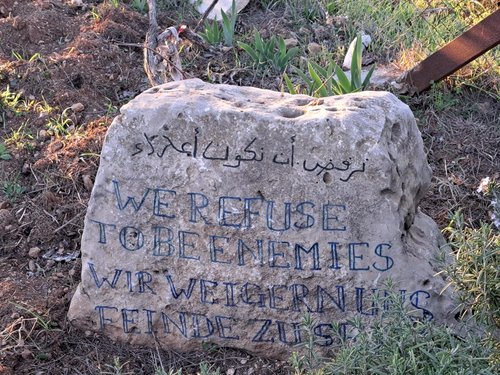 They have faced threats and violence against themselves and their crops; they have demolition orders placed on all their buildings; they are permitted no running water or electricity on their land; yet, at the farm’s entrance, on a large rock, is painted the words, ‘We refuse to be enemies’. The family were awarded the World Methodist Peace Prize for their non-violent resistance.
They have faced threats and violence against themselves and their crops; they have demolition orders placed on all their buildings; they are permitted no running water or electricity on their land; yet, at the farm’s entrance, on a large rock, is painted the words, ‘We refuse to be enemies’. The family were awarded the World Methodist Peace Prize for their non-violent resistance.
Sadly, their experience is all too common. The World Council of Churches Ecumenical Accompaniment Programme in Israel Palestine (EAPPI) provides volunteers to monitor what is happening on the ground and to be with children and vulnerable adults in an attempt to minimise the danger of threats and violence that they might face from those who would drive them off their land, or the harassment that they might face from the military and settlers as they pass through army checkpoints to get to school.
We met Tariq, a 20 year-old Muslim, who is a Bedouin. Tariq is an English teacher, and lives at Umm Ul Khair, in the South Hebron Hills, a village where EAPPI monitor the situation. He has lost hope. The houses in his village have been demolished several times by those who want to extend the illegal Israeli settlement right next to them.
Water is piped under, and electricity over, their village to the settlement next door, but Tariq’s community are not allowed either. Their oven was demolished as a settler said its smoke was blowing towards his house. Last year, Tariq’s uncle stood before a military vehicle and a settler truck that came to seize Bedouin cars.
The military did not advance, but watched as a settler did, running Tariq’s uncle over; he died 14 days later in hospital. Tariq’s brother was shot at and beaten up for grazing cattle some years ago; he now has severe brain damage. In the two weeks before our visit, the villagers have been banned from grazing their goats as a settler-shepherd wanted that land; we saw the herd confined to a pen. A settler filmed our visit.
In Deuteronomy 7:1-2, there is a command that 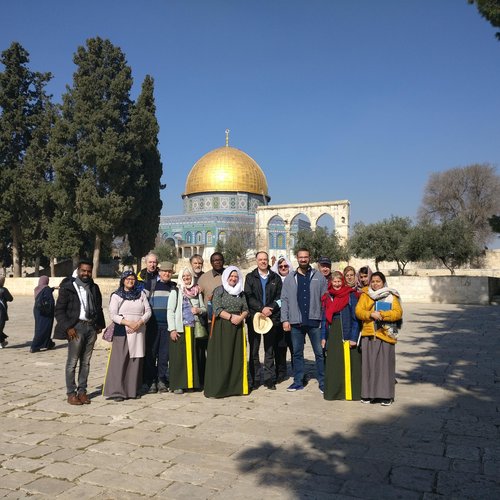 the Israelites must slaughter every man, woman and child to seize the land from the Canaanites and other peoples living there. People throughout the ages, including some Christians, have engaged in genocide, but we do not accept that narrative, nor do we believe in a God that supports ethnic cleansing. We recall how Jesus healed the daughter of a Canaanite and taught that we love our neighbours, as the Good Samaritan did, and that we love our enemies. We recall how the Jewish writers of Ephesians and 1 Peter speak of the gentiles as also being chosen people. And the writer to the Hebrews speaks of the Patriarchs as ‘strangers and foreigners on earth…who were desiring a better country, that is, a heavenly one.’
the Israelites must slaughter every man, woman and child to seize the land from the Canaanites and other peoples living there. People throughout the ages, including some Christians, have engaged in genocide, but we do not accept that narrative, nor do we believe in a God that supports ethnic cleansing. We recall how Jesus healed the daughter of a Canaanite and taught that we love our neighbours, as the Good Samaritan did, and that we love our enemies. We recall how the Jewish writers of Ephesians and 1 Peter speak of the gentiles as also being chosen people. And the writer to the Hebrews speaks of the Patriarchs as ‘strangers and foreigners on earth…who were desiring a better country, that is, a heavenly one.’
We pray for the peace of Jerusalem and the land called holy. We pray for the justice upon which true peace can only be founded. We pray for all the peoples of that land, including our brothers and sisters in Christ.
The Living Christianity programme is run each January, during the Week of Prayer for Christian Unity. It is supported by the Methodist Liaison Office in Jerusalem, the Global Relationships team, and the World Mission Fund.
Conrad Hicks February 2023